The best books on writing for aspiring writers
Ready to get serious about writing? These titles will help.
Great writing can change the world.
And even if your ambitions are less grand, solid writing skills will help you and your business reach its goals.
Each book listed in this article will help you become a better writer in some way. However, better is a vague objective.
That’s why the books below are grouped according to the specific writing skills and areas they will help you improve. These include:
- Writer motivation
- Grammar and style
- Organization
- Examples of great writing
- Idea generation
- Speed
- and business understanding.
This resource will not only help you improve your craft but also show you how to leverage the skill of writing into so much more. Let's get started.
Best writing books for beginners
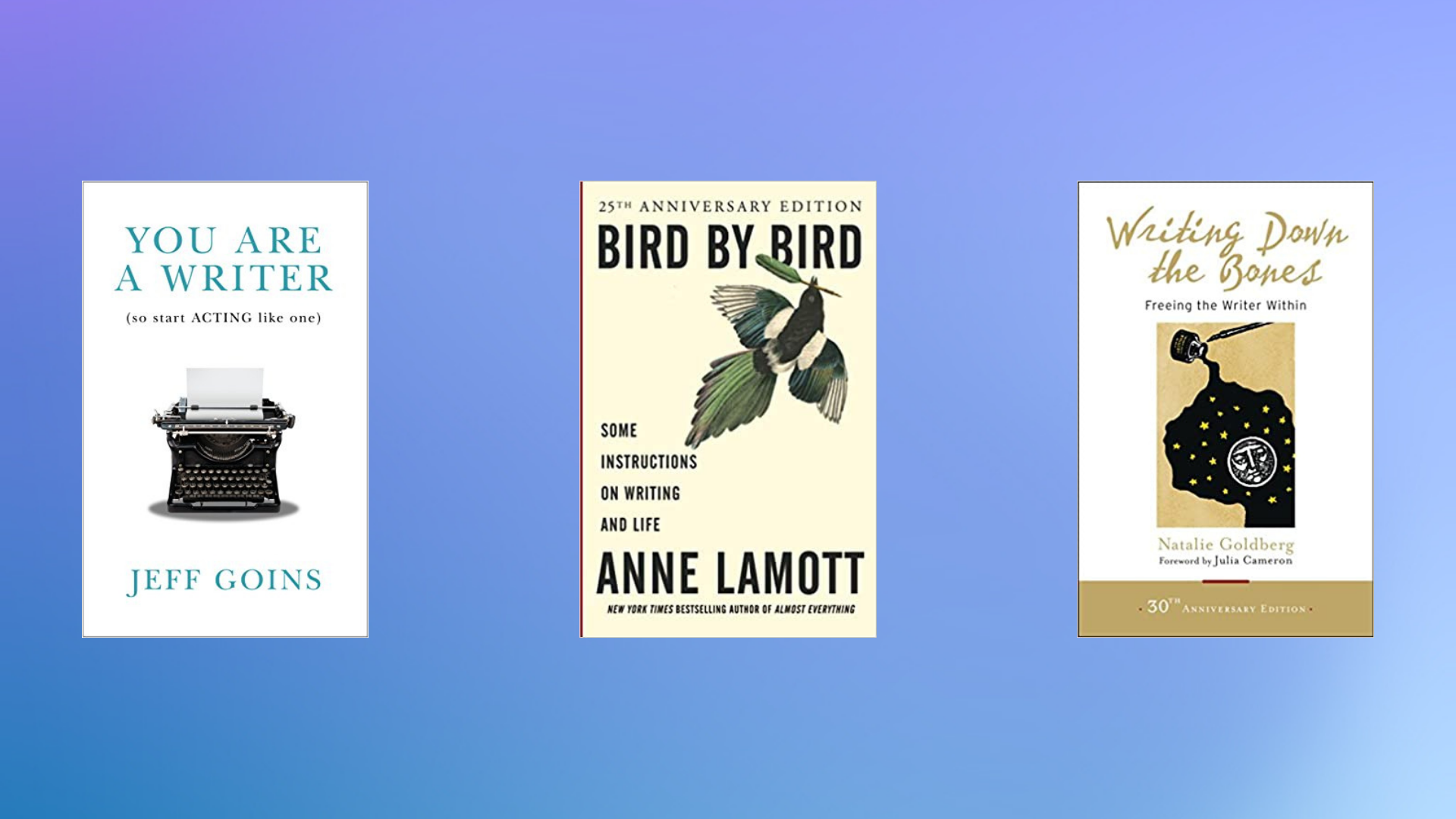
You Are a Writer by Jeff Goins
Writing is mostly a mind game. It’s about tricking yourself into becoming who you are. If you do this long enough, you begin to believe it. And pretty soon, you start acting like it. — Jeff Goins
Part memoir, part handbook, Goins delivers one of the most user-friendly reads for aspiring writers.
The book explains what it means to be a writer as the author worked to discover it for themself. One of the main messages is that prioritizing the skill and practice of writing is a must. In the beginning stages, nothing is more important than getting words on a page.
In You Are a Writer, the author also touches upon how to get your work in front of more people, from the basics of building an audience to leveraging that attention for greater writing opportunities.
Bird by Bird by Anne Lamott
Almost all good writing begins with terrible first efforts. You need to start somewhere. ― Anne Lamott
Lamott is an expert writer with a streak of irreverence towards the standard rules of the craft. This makes for both an entertaining read as well as a hands-on guide to breaking rules well.
Much of Lamott’s advice revolves around the belief that the best writers are the ones who are most aware. They pay attention, ask questions, listen deeply, and capture the moments most people overlook.
This book is handy for writers who are unclear about the style or genre they would like to write because it champions experimentation above all else.
The Writing Life by Annie Dillard
He is careful of what he reads, for that is what he will write. He is careful of what he learns, for that is what he will know. ― Annie Dillard
This short book is a treasure trove of inspirational content.
Although new writers will not find step-by-step instructions on the craft, Dillard does deliver a cohesive, enticing, and at times intimidating look at the process of creating great writing.
One of the overarching messages included in the book is a call not to hold back. At every opportunity, a writer should empty themselves and their ideas on to the page.
The fear that you will run out of ideas or stories is a normal part of the process but one that is easily remedied by following a schedule for input (reading) and output (writing).
Zen in the Art of Writing by Ray Bradbury
Write. Don't think. Relax. ― Ray Bradbury
As one of the most prolific writers of the last century, Bradbury is a voice every writer should read at least once.
Their guide for writers encourages creatives to get lost in their work, not let logic suffocate creativity, and allow ideas to carry them to unexpected places (instead of always trying to control the process).
The author's advice focuses on fiction storytelling but also includes sections on nonfiction and poetry. Regardless of your chosen genre, this resource will help free your creative process.
On Writing by Stephen King
Amateurs sit and wait for inspiration, the rest of us just get up and go to work. ― Stephen King
There’s a reason almost every writing resource list mentions this book by Stephen King: it’s that good.
On Writing is an intensely practical book, told through the lens of King’s life stories, and filled with concrete examples of how to transform forgettable sentences into remembered treasures.
Plus, the author has a knack for spinning their insights into motivational pieces so that readers not only come away from the book understanding how to write better, but wanting to commit to the practice as well.
Writing Down the Bones by Natalie Goldberg
Writing is the act of discovery. ― Natalie Goldberg
Although writing may be an applied skill, there are also emotional and psychological aspects to it.
Goldberg captures these deeper elements of writing in their book in order to help writers communicate more fully through their words. For the author, great writing is a product of facing difficult subjects head-on and then inviting others onto the journey with you.
One technique mentioned in the book which many new writers find helpful is to write with a pen and paper instead of a computer and keyboard. This tactile element can help connect the writer to their subject while preventing blocks sometimes caused by a blinking cursor.
Best books to improve writing style
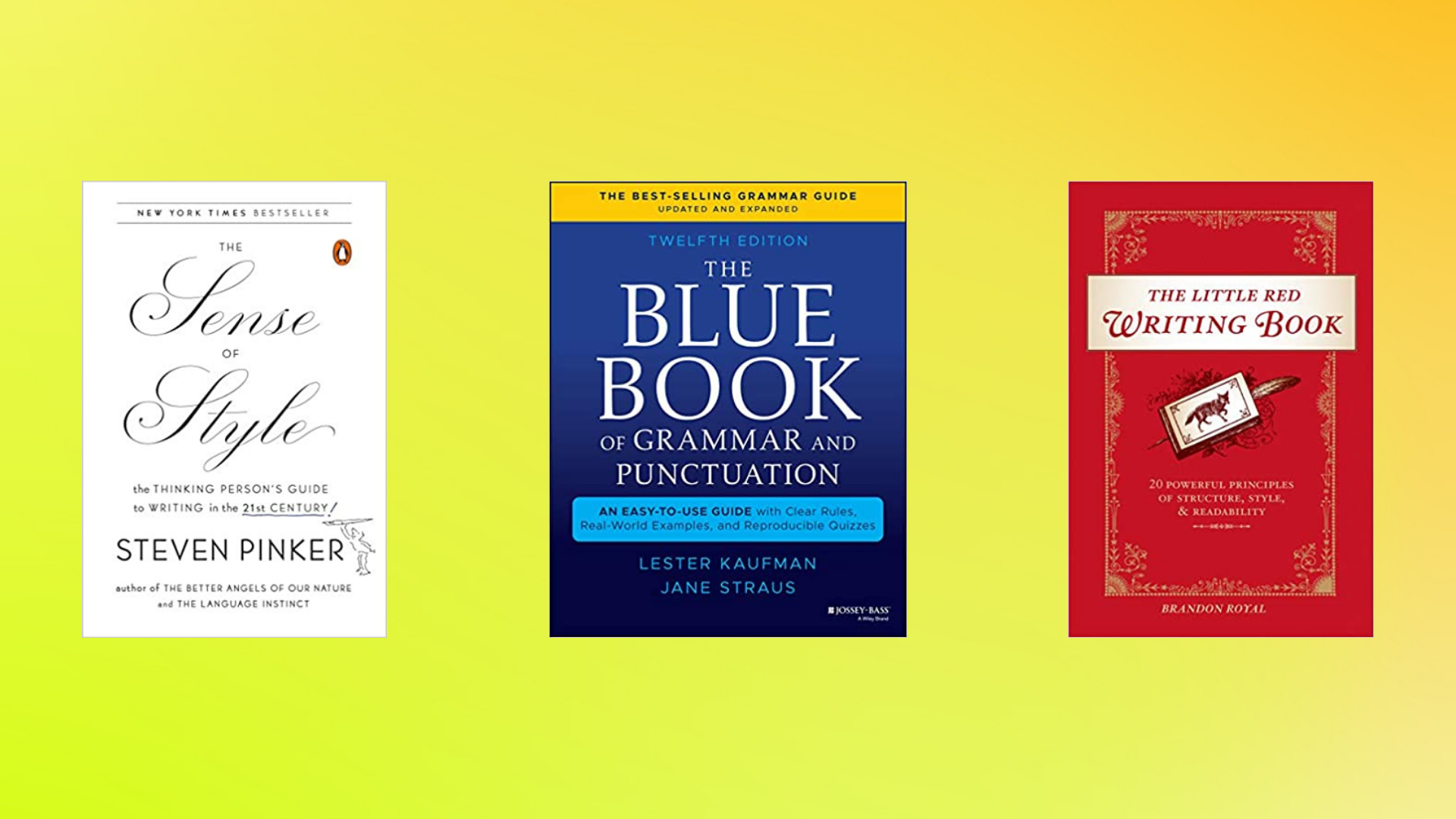
The Blue Book of Grammar and Punctuation by Jane Straus
You don’t have to be an English major to understand grammar and punctuation. You just need rules and guidelines that are easy to understand, with real-world examples. — Jane Straus
You must learn the rules of writing before you can break them.
The Blue Book is an accessible guide that both summarizes and simplifies the rules most of us forgot or never learned in English class. From how to use a comma properly to choosing the appropriate pronouns, this guide is full of actionable information.
What makes this resource extra useful is its collection of activities, examples, and quizzes. Though this book takes some work to get through, you’ll come out the other side a stronger writer.
The Sense of Style by Steven Pinker
Style still matters, for at least three reasons. First, it ensures that writers will get their message across… Second, style earns trust. [Third] it adds beauty to the world. — Steven Pinker
Pinker is a Harvard professor of psychology who writes on how language and the brain connect. One would expect a style guide from such a writer to be dry or academic.
Instead, Pinker delivers a love letter to the craft that explores not only what makes good writing, but why our brains recognize it as such.
Throughout the book, one of the most valuable practices is how the author reverse-engineers what great writers do in specific passages so that new writers can attempt the same moves in their work.
The Elements of Style by William Strunk Jr. and E.B. White
When a sentence is made stronger, it usually becomes shorter. — William Strunk
This short guide is a rule book for great writing, with most of the principles explained in a page or less.
Brevity, clarity, and purpose drive this resource. If you struggle with long or unclear sentences or aren’t sure how your style should adjust to your topic, this is a must-read.
It’s recommended to pick up a physical copy of this book, since having it within reach will be exceptionally useful during your editing phases.
The Little Red Writing Book by Brandon Royal
Merriam-Webster’s Vocabulary Builder by Mary W. Cornog
It Was the Best of Sentences, It Was the Worst of Sentences by June Casagrande
Best books on writing organization
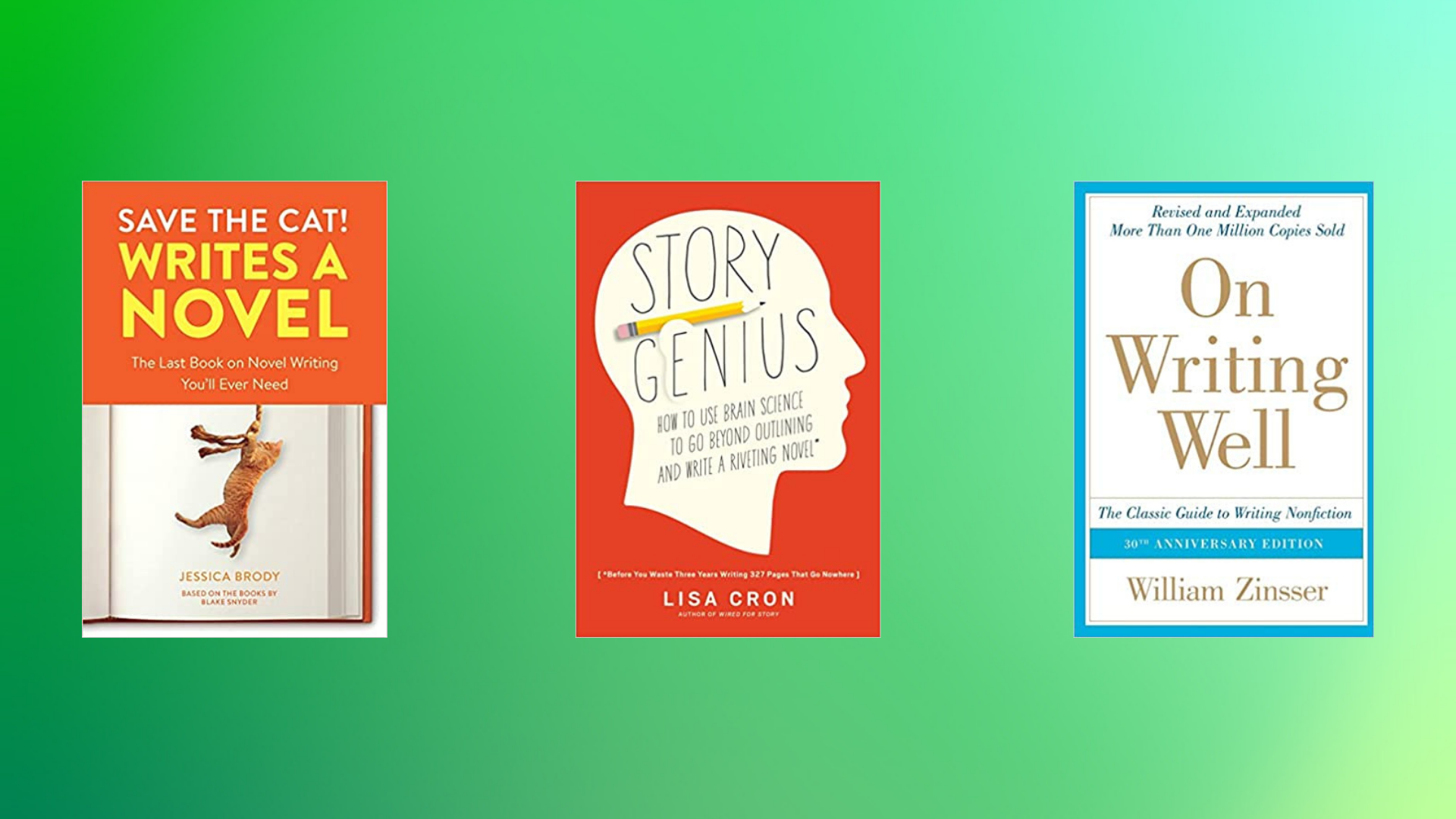
Save the Cat! Writes a Novel by Jessica Brody
Plot, structure, and character transformation. Or what I like to call the ‘Holy Trinity of Story.’ — Jessica Brody
Save the Cat began as a book on screenwriting principles. Then, because of its immense popularity, it spawned into a 7-part series covering multiple genres and formats.
This entry on writing a novel is helpful for both fiction and nonfiction writers as it teaches the basic building blocks of telling stories. It accomplishes this feat by outlining ten genres and showing readers how even the most creative pieces follow pre-made formulas.
This resource will help not only help you organize your writing but also complete projects faster.
Take Off Your Pants by Libbie Hawker
A satisfied reader is all you need for a ‘good’ book. — Libbie Hawker
Hawker’s book is a no fluff guide to writing stories people want to read.
This resource focuses on book-sized writing projects, but all of the author’s tips can be applied to smaller projects simply by truncating the individual elements.
One of the main takeaways from the book is that more detailed outlines make for faster writing. The more time you spend figuring out how your ideas connect, the easier it will be when writing.
On Writing Well by William Zinsser
Writing is thinking on paper. ― William Zinsser
This book is the gold standard for writing great nonfiction.
Nonfiction isn't only about real stories but also ideas, arguments, and data. These elements are just as essential as plot or character are to fiction, and learning how to master them is crucial.
The third section in Zinsser’s book covers particular forms of nonfiction writing, such as interviews and memoirs. This is a great place to start for those looking for a subgenre that aligns with their skills and interests.
Everybody Writes by Ann Handley
Plot & Structure by James Scott Bell
Story Genius by Lisa Cron
Best books for modern writing examples
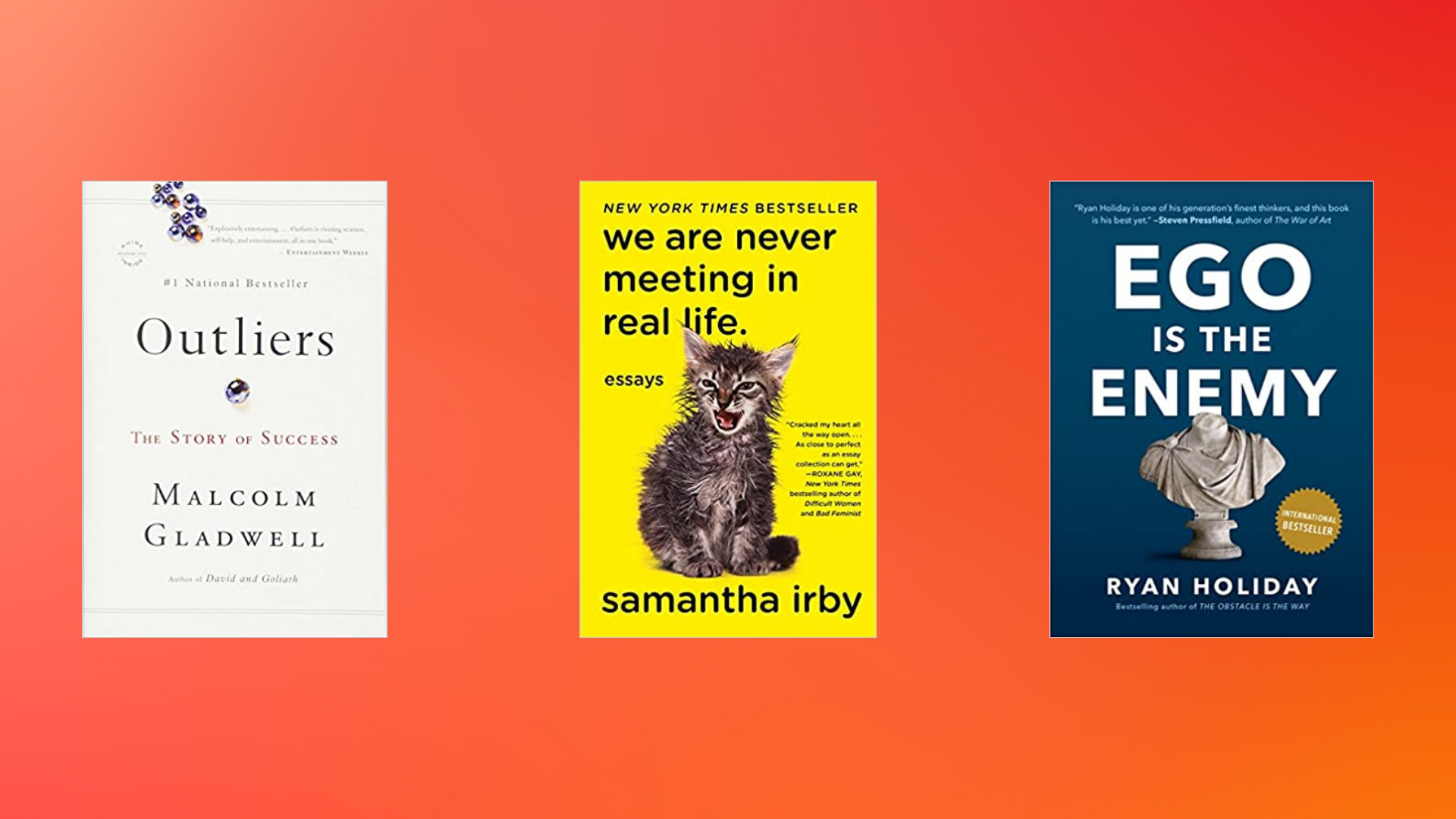
The Psychology of Money by Morgan Housel
Things that have never happened before happen all the time. ― Morgan Housel
Amazon contains over 90,000 books in their Business & Money category. So how do you write uniquely about a topic that has been covered that many times?
You find what’s interesting about it to you and share that.
Housel’s book is a collection of lessons on why people make the financial choices they do with money, and steps for making better ones.
If you’re looking to cover a well-worn topic, look to this book for clues on how to do it in a refreshing, authentic way.
Outliers by Malcolm Gladwell
Hard work is only a prison sentence when you lack motivation. ― Malcolm Gladwell
Gladwell is one of the most prominent writers alive today because they do two difficult things well: challenge assumptions and transition smoothly.
Most of Gladwell’s books address topics people think they know well. But, if you can surprise your readers in some way, you can be sure they will tell others about what they’ve read.
Moving from one idea to another, whether across a paragraph or a page, can be tricky. Gladwell does this with supreme ease, often forgoing "proper" transition phrases altogether. If you'd like to learn how to smooth out your writing, give this title a read.
Ego is the Enemy by Ryan Holiday
Impressing people is utterly different from being truly impressive. ― Ryan Holiday
Many of the books mentioned in this list explain why brevity and conciseness are important to great writing. Holiday embodies these elements.
Their books are typically shorter than most nonfiction books, but the remarkable part is how much information Holiday is able to convey in a single sentence. They can tell stories in a few lines that would take other writers several pages.
For those wanting to trim the fat in their writing, this is one author worth studying.
We Are Never Meeting in Real Life by Samantha Irby
Made to Stick by Chip and Dan Heath
The Great Gatsby by F. Scott Fitzgerald
Best books on generating new ideas
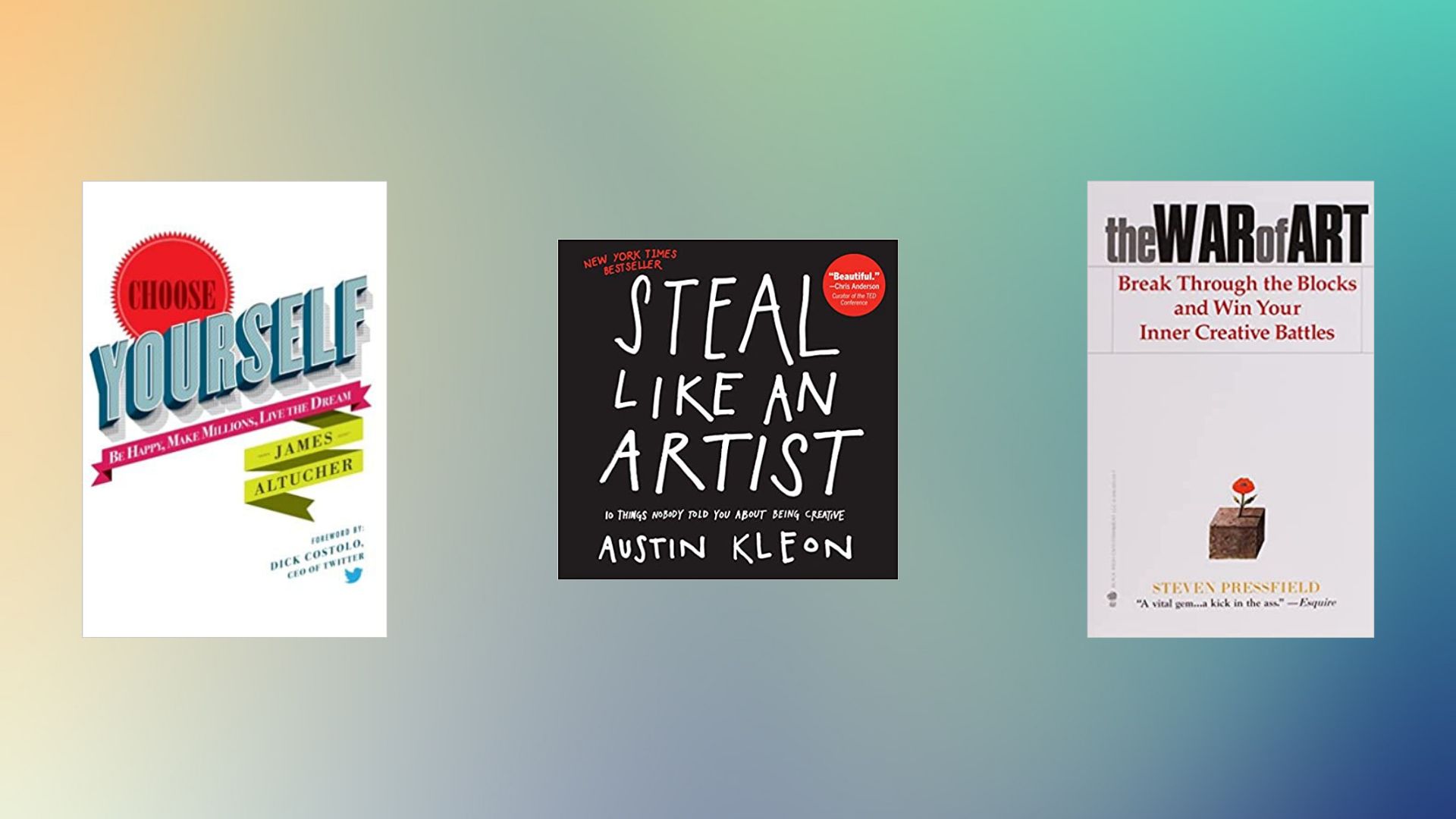
Choose Yourself by James Altucher
Diversification is everything. You get past ‘this’ by having lots of 'that's'. ― James Altucher
Altucher is a unique character with a habit of turning random ideas into thriving businesses.
In the book, they explain how anyone can transform their brain into an idea machine: write down ten ideas a day, every day, about anything. Altucher provides dozens of examples to support the argument that the stranger the combination, the more promising the results.
If you struggle to come up with unique ideas or angles to write about, this resource and practice will help.
Steal Like an Artist by Austin Kleon
The best advice is not to write what you know, it’s to write what you like. ― Austin Kleon
The most prolific creators, writers or otherwise, understand how to steal well.
For Kleon, this practice isn't simply taking what others have done and presenting it as your own. Instead, it's understanding how to follow the same processes, chase the same goals, and evoke the same emotions as the original does.
This is an excellent resource for those who want to create like their heroes without copying them.
The War of Art by Steven Pressfield
The most important thing about art is to work. Nothing else matters except sitting down every day and trying. ― Steven Pressfield
Pressfield argues that the enemy of creative work is called resistance. And while it takes many forms, there is always one sure way to overcome it: sit in your chair and write.
Creators will never be completely free from distractions, roadblocks, and fears.
The solution, then, is to push through it. Your best ideas are already there; they just need you to fight for them.
The Artist’s Way by Julia Cameron
Big Magic by Elizabeth Gilbert
Best books on writing faster
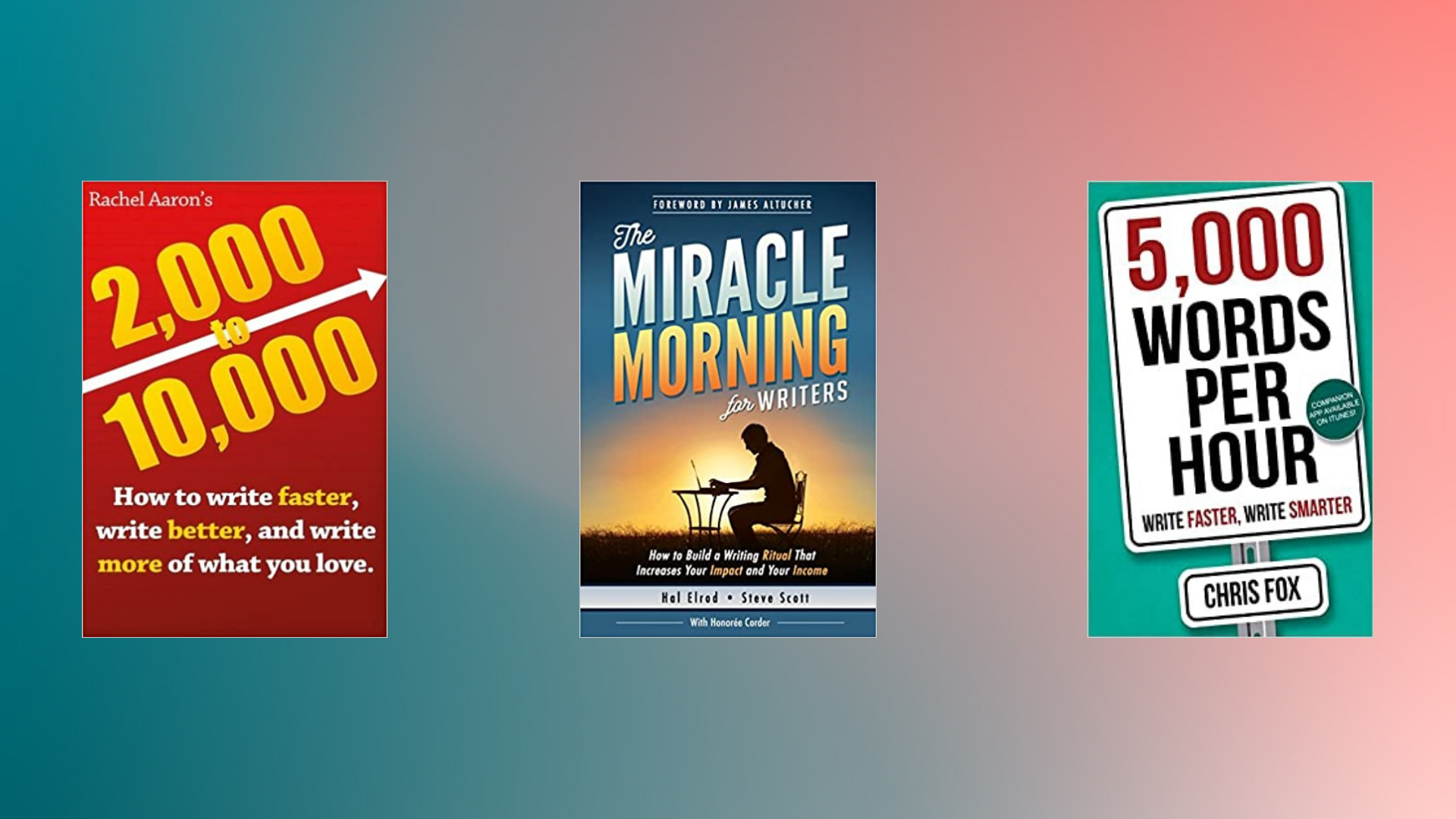
5,000 Words Per Hour by Chris Fox
Planning is your best friend if productivity is your goal. ― Chris Fox
Being able to write large amounts quickly is a skill that can benefit any writer. But scribbling mountains of nonsense isn’t useful. The key is learning how to increase speed while maintaining quality.
Fox has perfected a system for this goal. In their book, they explain how to use a few different tools to help accomplish incredible levels of output. These include writing sprints, dictation software, and timed flow states.
This short, practical guide is an excellent resource on both writing fast and managing your time well.
The Miracle Morning for Writers by Hal Elrod
Most people start the day by checking email, texts, and social media. And most people struggle to be successful. It’s not a coincidence. ― Hal Elrod
Learning to write efficiently is a product of building a schedule that supports your writing habit. This book explains how to accomplish this by structuring the first 2-3 hours of your day completely around writing.
The authors, Hal Elrod and Steve Scott, are both enormously prolific with over 50 books published between them. They’ve homed in on the patterns that work and share them in a strategic way for readers.
A great takeaway from this title is that it identifies writing as a holistic activity. Therefore, creatives who take care of their mental and physical health will, almost by default, be more productive and creative in their writing.
This book will teach you how to write better by Neville Medhora
If you want people to listen to what you have to say, you need to be interesting! — Neville Medhora
This short guidebook (<60 pages) introduces basic copywriting elements that any writer can use to make their content more interesting.
Medhora combines brutal honesty with playful humor to communicate some of the hard trusts writers must face, such as that readers are selfish, easily bored, and pressed for time. Writing that understands these challenges, and solves for them, gets read.
This resource is also a valuable introduction to voice, and how finding yours can supercharge your writing process.
2k to 10k by Rachel Aaron
Turning Pro by Steven Pressfield
Best books on the business of writing
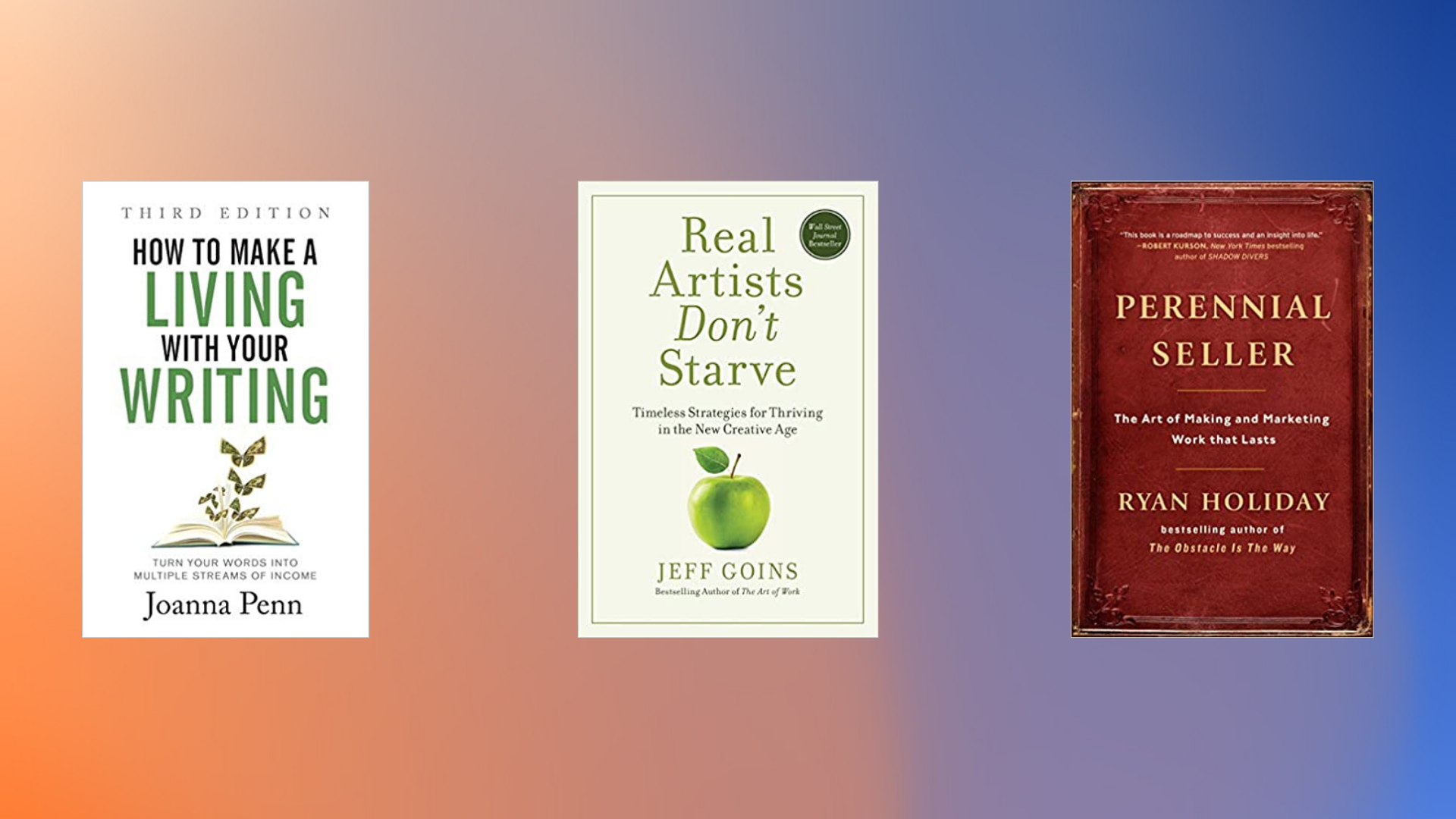
Real Artists Don’t Starve by Jeff Goins
What got her there was not some lofty dream. It was gradual and persistent action in the right direction. ― Jeff Goins
In this book, Goins challenges the sentiment that people who choose artistic paths must struggle financially.
Chapter by chapter, the author gathers examples of successful artists, writers, and creators and breaks down the business models they use to succeed with their work.
If you want proof that people can make it as a writer without needing to hit a bestseller list, this is for you.
Perennial Seller by Ryan Holiday
Nothing has sunk more creators and caused more unhappiness than this: our inherently human tendency to pursue a strategy aimed at accomplishing one goal while simultaneously expecting to achieve other goals entirely unrelated. ― Ryan Holiday
How do you make something that lasts beyond your lifetime? This is the question Holiday answers with their book by examining common elements from the classics still read today.
Beneath the discussion of enduring work is the theme of funding that work. Despite the rare cases of broke artists becoming famous after their deaths, most of the classic works we still interact with today were popular when they were current.
The more financially successful a project is, the more likely it is to survive. Success isn’t an enemy of creative work — it’s the fuel for it.
How To Make a Living With Your Writing by Joanna Penn
If you love to create new things in the world, you can now earn decent money doing it. — Joanna Penn
Thanks to the internet, there are now dozens of ways to earn money as a writer. The author made most of their income from self-publishing books and making those books available in multiple formats (digital, audio, paperback).
The book covers a host of alternatives, including ways to monetize a blog or newsletter, how to leverage writing into consulting or speaking opportunities, and the best ways to start freelancing.
Turning your words into income is a realistic goal. You just need to know where to start.
The Business of Being a Writer by Jane Friedman
Building a StoryBrand by Donald Miller
Next step for aspiring writers
The books you read will inevitably shape your path as a writer.
They will give you ideas, direction, and guidance. But what they can’t do is write for you. That part is up to you.
If you’re looking for a platform where you can start sharing your words with the world, try Ghost. It’s a simple, fast, and powerful publishing tool built with writers in mind.






